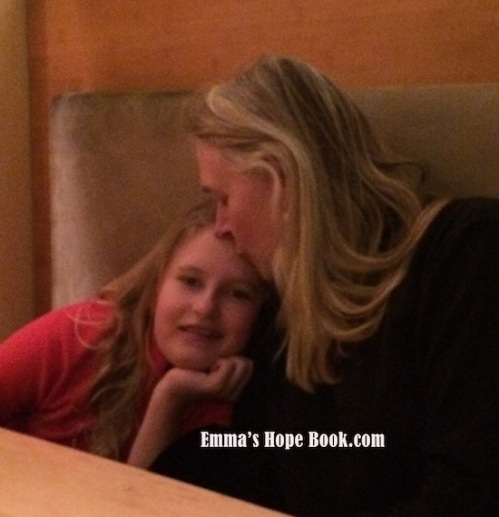“You get to write about thinking feelings are facts,” Emma typed this morning. Then she smiled at me, got up, and walked away.
Eight months into this whole homeschooling thing and I’m just now starting to figure out how I can work this blog into our busy schedule. Emma wrote the other day that she would write a blog post once a week or, she thoughtfully added, “suggest topic for you to write about.” Then last week she wondered if she might ask questions that she hoped readers would want to respond to. The first of that series with all the wonderfully considerate, insightful and thoughtful comments and answers to her questions from readers, can be read ‘here.’
My goal is to carve out time Tuesday and Thursday to post something on this blog. Only time will show how well I do with this goal.
But for today, Emma has given me an assignment. “You get to write about thinking feelings are facts.” When she typed this sentence I immediately thought of “the mean voice.” This is the voice in my head whose sole purpose seems to be to give a running critique of everything I’m doing and why it’s all wrong. The Voice is harsh and can be very, very cruel. It will say things to me that I would never say aloud to another human being, no matter how angry I might be. The Voice feels real, it says things in a matter-of-fact way that makes me think the words it is saying are true. When I believe The Voice all joy is deleted. Any glimmer of hope is snuffed out. The Voice tells me I suck and whatever I’m doing sucks.
But I’ve come to understand that The Voice is not to be listened to, which is easier thought than done. It does not tell me the truth, it is mean and it says things that are not based in fact. I call it “The Voice” but in fact, it is fear. It is hopelessness. It is anger. It is a whole medley of emotions, some of which I cannot even identify or untangle to identify. The Voice is feelings and it is most certainly not “fact”.
Feelings are not facts. Feelings are not facts. This is something someone said to me early on in my addiction recovery. It was one of those “slogans” that at the time made no sense to me. Well of course feelings aren’t facts, I remember thinking to myself. Anyone knows that. They’re feelings. But what I didn’t know then and what I still forget now, is that when I’m upset or scared or angry, the conclusions I come to as a result of having those feelings are also not facts. They are feelings and the two are very, very different.
So for example, if I’m afraid to do something that I really want to do, like write this book that Emma and I are working on together, I feel tremendous fear. The Voice kicks in and will say things like, “What the hell are you doing? Why are you even trying to do this? The last thing the world needs is a book written, even co-written by you. Who are you to write about your experience with this? Who do you think you are? No one wants to read what you think. You think this will be helpful to someone else? What kind of narcissistic, self-involved crap is that? You can’t do this. You suck.” If that doesn’t stop me in my tracks The Voice amps it up a notch and gets even more vicious.
People have suggested imagining a volume control dial and mentally visualizing turning the volume down. Others have suggested saying, Thank you for your thoughts and then doing the thing I’m terrified of doing anyway. Others have said – just don’t listen to it or don’t believe it. But none of that has had much impact or made a difference. Logically I know this voice isn’t real. It’s in my head. I know it isn’t some divine, all-knowing voice. I know it is mean. I know all these things, but when the emotions come it is like being pulled under and the energy it takes to keep my head above the water, the energy it takes to just breathe is exhausting and sometimes, most of the time, I don’t feel able to fight it.
When I was an active addict The Voice told me to go and eat. Go ahead it would say. Oh go on, you deserve it, The Voice would encourage. You’ve had a tough day, give yourself a treat, eat a dozen doughnuts. If I fought it, it only got louder and more insistent. Oh go on, GO ON! And I would. I couldn’t refuse. I felt out of control and helpless. I felt unable to stop. Now, almost two decades later, I know to “out” that particular voice. I know to tell on it. The Voice doesn’t like that. And saying to another human being who understands, who can identify, who can say – oh yeah… wow, I so get that – is often all it takes now to give me that moment of grace so that I can pull away and not do that thing that will hurt me, the thing that it’s telling me to do.
While The Voice is usually no longer the boss of me when it comes to food and compulsive over-eating, it has never completely gone away. It crops up when I least expect it. It tells me things about myself that make me feel awful. It makes me believe it’s telling me THE TRUTH. I’m fifty four years old and I still find myself believing The Voice, not about food and eating, but about other things, healthy things I want to do or accomplish. There’s another slogan used in addiction recovery – Progress not perfection. And I am making progress, but it is very, very slow. And to be honest, far slower than I’d like. But then if I gauge myself from where I once was, the progress has been nothing short of miraculous, so maybe the next post will be about – progress, not perfection! Unless Emma has another idea, that is…
I’m turning Emma’s topic over to all of you – “…write about thinking feelings are facts.”






